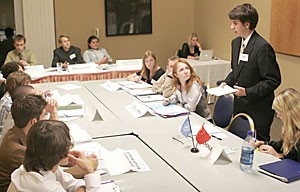More than 250 students met over the weekend at the Arizona Model United Nations Conference, where high school students discussed issues such as discrimination against women and the legalization of drugs.
“”(The conference) not only tries to make people aware of real-world issues, but also to try and create solutions to these problems,”” said Shaharyar Ashraf, undersecretary general of rules and procedures for Arizona Model United Nations and a junior majoring in physiology and molecular and cellular biology.
Ashraf said Mock U.N. is similar to mock trial, and students use real U.N. agendas and simulate committee debates and try to improve upon them.
Nine Tucson high schools and seven schools in Mexico were divided into different delegations representing different U.N. countries, said Jennifer Yelle, secretary general for Mock U.N. and a business administration senior. One-quarter of this year’s conference attendees were native Spanish speakers from Hermosillo, Mexico, she said.
Students acted as representatives from countries like Columbia or Equador, Yelle said.
The Organization for American States, a section of the conference conducted in Spanish intent on uniting nations in the Western Hemisphere, focused on mock Latin American issues.
One of the visions of the organization’s program is to give English speakers exposure to well-educated students who may not speak English but can discuss in Spanish international political issues like free trade, illicit drugs and women’s rights, said Morgan Sim, a junior majoring in political science and theatre arts.
“”(The Mexican students) will also get to interact with the English-speaking students from Arizona and realize that perhaps not all of these students represent the sentiments of the … White House,”” she said. “”The students from Mexico will see that there is a wealth of different opinions (in America about) how things should be conducted.””
Donations from local sponsors and private citizens allowed the students from Hermosillo to attend the conference for free. Their travel expenses, two-night hotel stays and delegation fees were all covered by the donations, Sim said.
Borderlinks, a local nonprofit organization, donated a translator for both nights to allow nearly every non-English-speaking attendee a private earpiece for translation of the speeches.
Dan Christensen, a junior at Desert Mountain High School, said he was impressed that the people in his committee, the Historical Security Council, were so committed to the issues.
“”Reenacting events of 1990, when the world was affected with the communism-versus-democracy debate, we simulated the events surrounding Nicaragua,”” he said.
Axel Mendivil Eng, a Campogránde freshman from Mexico, said he got a different perspective of the world from the conference.
Mendivil Eng said he hopes the conference will affect students’ opinions and show the world that various people, including those from Mexico, are interested in international affairs.
Alejandro Corral Hernández, a senior at Colegio de Bachilleres Plantel Reforma in Hermosillo, summed up his experience at the closing banquet:
“”It takes courage to come up and talk, but it also takes courage to sit down and listen,”” he said through a translator.









